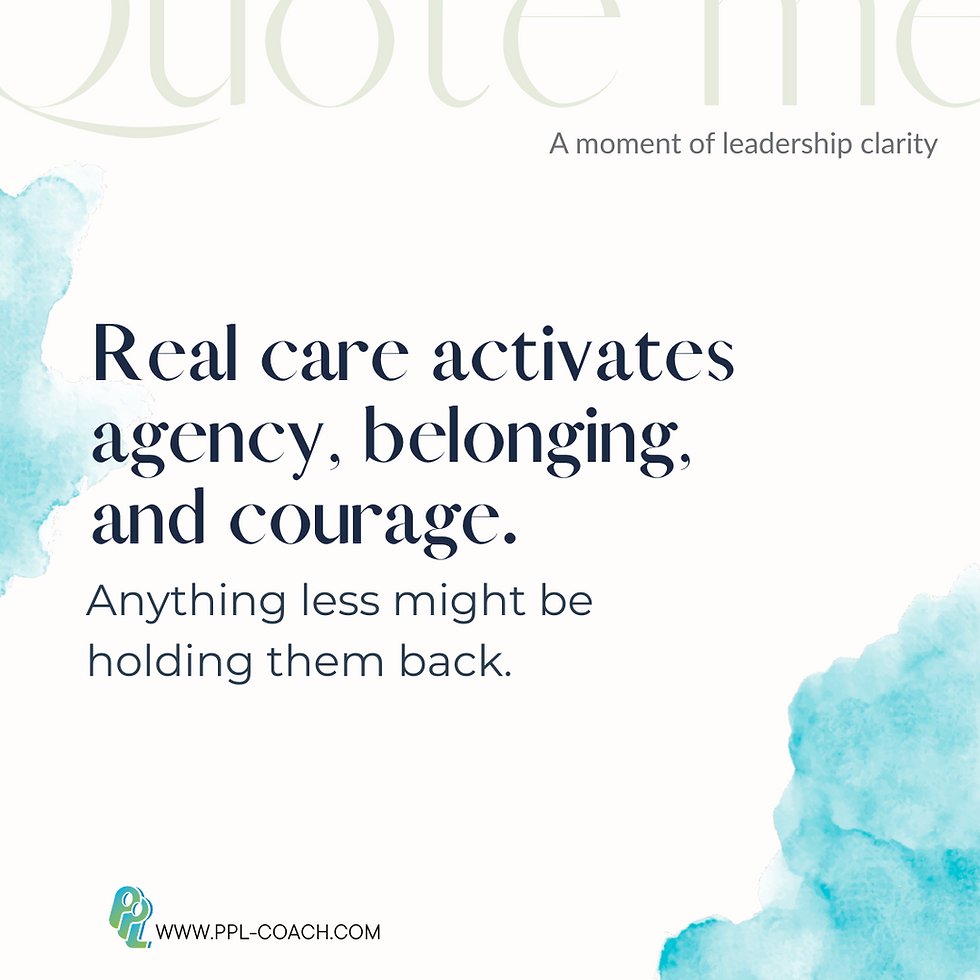When Care Holds Us Back: A look at how well-meaning leadership can quietly limit growth—and how to shift it.
- Anjali Leon

- Jun 13, 2025
- 3 min read
Updated: Jun 18, 2025
I sensed Miriam’s concern in her voice when I asked what was on her mind at the start of our coaching call.
“I care about my team,” she said slowly, “maybe too much.”
I pictured her sitting quietly, hands folded in her lap, a thoughtful crease forming between her brows. I let the silence stretch, trusting it would make space for what mattered.
“I just... I don’t want to add pressure,”
she continued.
“Everyone’s already stretched. So when things get complicated, I just do it. I don’t want them to feel overwhelmed. Or worse—like I don’t have their back.”
She paused again, then added—more hesitantly this time:
“But even with all that, our engagement scores are the lowest they’ve ever been. My team relies on me to make every decision. I’m cc’d on everything—I can’t keep up. And while everyone is nice to each other…no one really pushes each other to be better - it like they just go along to get along.”
There it was.
The consequences of the quiet trade-off so many caring leaders make without realizing it:
They trade growth for protection.
They trade challenge for comfort.
They mean well. But it doesn’t always serve them or their team.
It’s a tension I see often—especially in leaders with both high empathy and high standards.
That’s when I asked Miriam a question I’ve asked many times before:
“What if the way you care is actually holding them back?”
When Care Becomes a Cage
Unexamined, care can quietly become a form of overprotection.
And over time, it creates invisible constraints.
You might notice it in the small decisions:
A leader withholds feedback because they “don’t want to discourage.”
They avoid delegating because “someone already has too much on their plate.”
They don't encourage challenging ideas—“to spare discomfort.”
None of these choices come from bad intentions. Quite the opposite.
They’re born of a desire to do right by people.
But here’s what I’ve learned:
Real care doesn’t remove challenge. It prepares people to meet it.
That’s when care becomes a catalyst.
The Potential of Care
Care is a beautiful place to begin.
But its true potential is unlocked when applied with intention.
I call this activating the human edge—and it often comes down to three things:
Agency
True care offers people clarity on outcomes—then trusts them to find their own way there.
✅ Try this: In your next 1:1, ask:
“What would it look like for you to fully own this?”Then step back. Let them lead—even imperfectly. That’s where growth lives.
Belonging
Belonging is more than being included. It’s knowing you’re essential—your voice matters, your work matters, you matter.
✅ Try this:
“Here’s how what you did made a difference…”When people know they’re needed, they rise.
Courage
Some of the kindest leaders unintentionally create cultures of artificial harmony.
Conflict is avoided. Dissent is rare. Truth gets diluted.
But courage isn’t about confrontation. It’s about making room for what’s real.
✅ Try this:
“What might we be missing?”“Who sees this differently?”Then show them it’s safe to disagree—by modeling what it looks like.
When Leaders Stretch the Care…
Something shifts.
Teams stop waiting for permission.
Accountability rises.
Ideas sharpen.
People stretch—not because they’re forced, but because they’re energized.
They feel trusted.
They feel seen.
They feel brave.
I once worked with a leader who said:
“I see my role as putting a steady hand on someone’s back—not to push, but to remind them I believe in their ability to take the next step.”
That’s what real care looks like.
It’s not stepping away. It’s standing beside.
It’s not asking less of people. It’s believing more in them.
It’s not about removing every barrier. It’s about helping them discover their capacity to rise.
What Miriam Discovered
After surfacing insights that were deeply personal and uniquely her own,
Miriam took a breath—and then smiled.
“Maybe the real way I care is by helping them stretch,”
she said thoughtfully.
“I’ll use my care to foster more agency, belonging, and courage.”
I could feel the shift.
Not just in her words, but in her presence.
She wasn’t letting go of her care—she was elevating it.
And I couldn’t help but feel hopeful about what that shift might unlock—not just for Miriam, but for her entire team.
An Invitation to Leaders
If you consider yourself a caring leader, hold onto that. It’s a gift.
But also ask yourself:
Where might my care be offering comfort but not growth?
Who on my team who’s ready for more agency but hasn’t been invited into it?
What might it look like to stretch my care this week—not to challenge harder, but to believe deeper?
Stretching your care doesn’t mean you care less.
It means you’re ready to lead in a way that helps others grow into their potential—while staying grounded in your own.





Comments